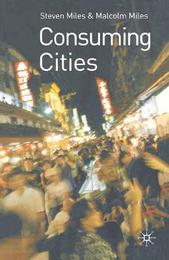
|
Consuming Cities
Hardback
Main Details
| Title |
Consuming Cities
|
| Authors and Contributors |
By (author) Malcolm Miles
|
| Physical Properties |
| Format:Hardback | | Pages:209 | | Dimensions(mm): Height 216,Width 140 |
|
| ISBN/Barcode |
9780333977095
|
| Classifications | Dewey:307.76 |
|---|
| Audience | | Tertiary Education (US: College) | | Professional & Vocational | |
|---|
| Illustrations |
VI, 209 p.
|
|
Publishing Details |
| Publisher |
Bloomsbury Publishing PLC
|
| Imprint |
Red Globe Press
|
| Publication Date |
27 August 2004 |
| Publication Country |
United Kingdom
|
Description
Contemporary urban consumption touches the everyday lives of most citizens and permeates discussion of society and culture today. Consuming Cities looks at this topic from perspectives in both sociology and cultural theory, drawing together references from mainstream and also less obvious sources in both literatures. Each chapter includes a specific case of a city or aspect of consumption, ranging from a history of urban consumption, gambling to the consumption of culture and its place in tourism to the consumption palace of the cruise liner. This definitive and accessible book will be an invaluable resource to a wide range of students.
Author Biography
MALCOLM MILES is Reader in Cultural Theory in the School of Art and Design at the University of Plymouth. He is author of Art, Space and the City (Routledge, 1997) and The Uses of Decoration: Essays in the Architectural Everyday (Wiley, 2000). He is a member of the Board of Landscape Research Group and of the Council of Management of Spaces Gallery. STEVEN MILES is Head of Research, Centre for Cultural Policy and Management at the University of Northumbria. He is author of Consumerism as a Way of Life (Sage 1998), Youth Lifestyles in a Changing World (Open Un
Reviews' an accessible and well-disposed inquiry into the impacts of consumption on contemporary cities and urban ways of life...Consuming Cities makes for interesting reading. It successfully frames some fairly complex theoretical issues within a variety of often interesting and always well-chosen cases. The book is excellent reading material for both graduate and undergraduate students, serving not only to bring together a variety of approaches from within the sociology of consumption, urban studies and cultural studies, but also as an eye-opener to some of the problems that an ongoing commodification of city life might pose to us as citizen's, consumers or planners of contemporary cities.' - Acta Sociologica
|